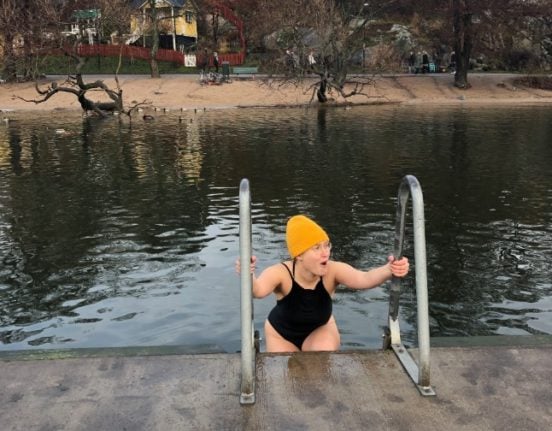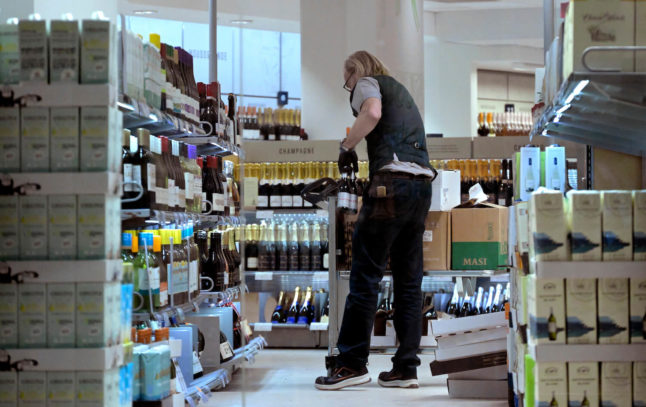Everyone has their New Year’s traditions. In Colombia you might fill your pockets with lentils and run around the block in yellow underwear. In the Philippines you might hang 12 round fruits above your door.
In Sweden, you’ll get drunk and watch Dinner for One.
Being a third culture kid, I came up with my own while living in Scandinavia: a very cold swim.
Come January 1st you’ll find me at the pier in Tantolunden, Södermalm, or the nearest open body of water.

The dog shivers on the beach where I’ve wrapped him in a towel to keep him out of the cold. I rest my hand gently on top of the water and ask for permission to go in (a Coast Salish tradition I picked up in Canada).
Being half-Finnish I must curse the Swedes to generate enough sisu (a Finnish word for reckless bravery) to go in. According to some fucking good science, swearing also increases your threshold for pain.
Slowly, feet first, I lower myself into water that was ice less than a week ago.
My body screams, ‘what are you doing to me?!’ gasping for air that just won’t stay in my lungs. And I frantically splash towards the ladder to get out again.

Every time I go cold water swimming I question my sanity.
But rather than wrap myself in the dog-warmed towel, I immediately want to go in again. It’s addictive. Like a shot of the strongest espresso direct to the bloodstream.
The next time is easier. My body knows what’s coming. By this point, my blood has rushed to my vital organs and left my extremities numb to the cold.
My mind goes into what can only be described as a meditative trance. I can hear the soft tinkles of raindrops on the surface of the water, the traffic on the bridge, my heartbeat thumping rapidly. I have stopped thinking.
I only get out when my muscles start to feel like they’re turning to stone.

When I clamber onto the jetty I’m dizzy with endorphins. My legs are bright pink and blotchy. I feel high; mighty enough to win an arm-wrestling contest with Thor.
First comes the cortisol, a stress hormone released from your adrenal glands. That’s the initial panic shock response; gasping for air, questioning the terrible life decisions that led me to this point.
Then there’s a surge of beta-endorphins which provide pain relief and a sense of euphoria. This is what makes you feel high.
Other than having the place almost entirely to yourself, there are innumerable benefits to the cold water plunge.
For some, it’s helped with everything from chronic fatigue to depression. For others, like my grandmother, it’s a sign of madness.
Cold water swimming kicks your immune system into gear. And, contrary to popular belief, immersing yourself in cold water can actually increase your libido.
It has a long tradition in northern countries. In Eastern Europe and Russia, winter swimming is how they celebrate Epiphany. In the UK, where I grew up, swimming in the sea is a way to ring in the new year and freeze-out the hangover. In the Nordics, it’s part of sauna bathing rituals.
There are over 97,500 lakes in Sweden. We’re blessed with unrestricted access to the long Swedish coastline all year round with Allemansrätten (‘the right to roam’) – probably my favourite thing about the country. There’s also a chance that you’ll find a sauna nearby.
The more you subject yourself to cold water swimming, the more your body learns to adapt. Your heart rate calms down, you panic less and you can control your breathing.
After the initial shock, you adapt.
If we need anything for this coming pandemic year, it’s the resilience to adapt, breathe, and keep going.
Tips for cold-water swimming in Sweden:
- Wear a hat.
And not just a swimming cap. Heat leaves your body quickest from your head (as my Finnish mother always told me) so it’s best to insulate with a sturdy woollen hat.
- Don’t go in alone.
If none of your friends are delusional enough to join you, make sure to swim in a place where other people are around. Even if you’re the most confident swimmer in the world, our bodies can react in surprising ways on contact with cold water, so it’s good to make sure help is nearby.
- Don’t be drunk.
A quick dunk in Sweden’s frigid water will sober you up enough to kill you. Alcohol in the blood might serve up some Dutch courage and make you feel warmer but this means you won’t realise how cold you actually are. It also reduces your body’s ability to cope with stress and increases the risk of hypothermia.
- Don’t jump in.
Although tempting to get it over with, this is how people die. Your body needs to acclimatise to the cold gradually. If you dive bomb, there’s a chance your body could go into cold shock and you could drown. I’ll sometimes only dip up to my knees first, before running out again, and then gradually going deeper and deeper until I’m immersed.
- Have an exit strategy.
It’s important to bring enough warm clothes to wrap up after you’ve dried off, but it’s just as important to make sure that you can get out. Don’t swim anywhere with strong currents. Make sure there’s a ladder or a shallow beach nearby. And when you’re done, don’t immediately jump under a warm shower. Though tempting, it’s better to generate your own heat by running or walking or jumping or doing any form of brief exercise. Shivering is just your body’s way of warming itself up.



 Please whitelist us to continue reading.
Please whitelist us to continue reading.
Member comments